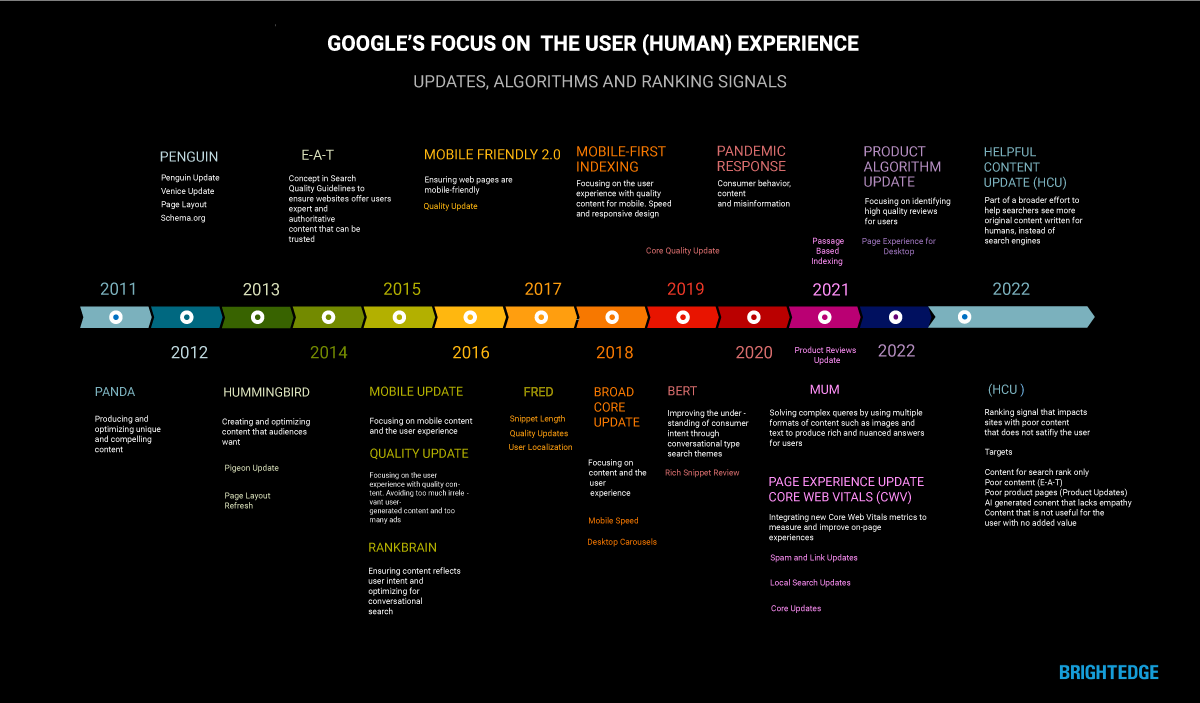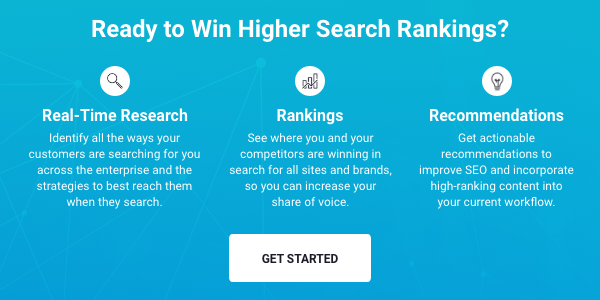What is it?
On August 18th, Google announced that it would launch an update to its search algorithm called the "Helpful Content Update." According to Google, this is part of a broader effort to help searchers see more original content written for humans, instead of search engines. This update is rolling out now.

Unlike some algorithm updates, which may target a single page, this update will be sitewide. It leverages a new machine learning algorithm to determine if a high amount of content on your site is deemed not helpful.
If this happens, you might see performance changes to your organic search channel, and it won’t appear in Google Search Console as a manual action/penalty.
Background and Context
For over a decade, Google has made continuous refinements to improve the quality of content served in its results. This focus predominately started with the introduction of Panda in 2011.
In 2014, Google shared its E-A-T (Expertise, Authoritativeness, Trustworthiness) guidelines to encourage marketers further to tailor on and off-page search and content strategies. The goal was to provide users with an experience containing the most relevant content from sources they could trust.
In 2015, the release of Micro-Moment Methodology furthered marketers' approach to understanding the customer journey and aligning content strategies with intent.
Today, the Helpful Content Update continues this trajectory by ensuring search users aren’t subject to automated content or content created primarily to rank in search engines. SEO practitioners who have been following Google’s guidelines for how to create quality content should not be surprised by any of the guidelines.
Who Will This Impact?
Google has indicated that this update will be implemented across all searches. However, they've also noted that some industries may feel more impact than others. According to Google, the sectors that will feel the most effects of this update include:
- Online-Educational Materials
- Entertainment
- Shopping
- Tech Related Content
Google did not elaborate on why they believe these specific segments may be impacted more than others. However, at BrightEdge, in conjunction with our partners at OnCrawl, we have noted some industries' search results feature more repetitive content in their listings than others.
This could be an issue that Helpful Content aims to reduce.
What Can Companies and Brands Do?
SEOs and digital marketers can ensure their content is aligned to what the Helpful Content update is designed to reward. In the announcement for the update, Google suggested some questions marketers or copywriters should ask about their content to determine if the Helpful Content update could potentially impact it.
From these guidelines, there are some inferences that marketers can make about how they approach writing content on their website, to continually adhere to the guidelines provided by Google.
Ensure
- Your content is aligned to your specific audiences
- Your author has (and can show) knowledge of the subject matter
- Your website content clearly shows your primary purpose
- Every reader learns something from your content
- You follow the guidelines for core updates and product reviews
- You don't over-optimize your content – it might work against you
- You are unique and write high-quality content. Follow Google E-A-T guidelines as they will grow in importance regarding what expertise and trustworthiness will be rewarded.
Conversely, we can infer from the questions that there are some things marketers should not do:
Avoid
- AI Generated Content Technologies that automate creating content around keywords
- Targeting keywords outside your sites' core competencies because they are trending
- Repeating content from other websites or manufacturers' descriptions, where able
- Over-optimize keywords on pages, so stop thinking about keyword density!
- Clickbait titles that do not align with what the page offers, do not mislead
- Pages that would require the user to go back and do another search to get more detail
- Repeating or summarizing content that is available elsewhere
These questions posted to marketers are all aligned with what Google has been saying for decades. If your SEO strategies are designed around these guidelines, this should be good news for the impact of this update. Helpful content should connect you with your visitors better and get more engagement out of your organic channel.
Key Takeaways:
- If you are following Google's guidelines for content creation, this update should be to your benefit
- Avoid content automation and excessive AI-driven content generation technologies
- Focus on making content that is unique and valuable to your user
- More than ever, SEOs need to help their organizations create content that aligns with audiences' intents, organize it in a structurally sound way, and strike a balance between what's good for humans and for being found in search engines.
Helpful content is good for marketers, especially those developing content to engage their audience and follow Google's SEO best practices.
Not only does it remove poor quality content from your customer's journey, but it should also improve their overall experience learning about your brand and exploring your content.
This all leads to a better conversion experience for your visitors. Helpful Content reinforces why it is critical to understand your audience's intent and needs as essential inputs into your content strategy.
Ultimately, this update is the latest in a long history of serving the most helpful content for users. Google continues to update its technology to remove poor quality content (there were three spam updates last year alone) and reward people approaching content on their site the right way – which is content that speaks to their visitors.
Leveraging BrightEdge for Helpful Content
BrightEdge can help you ensure your content and site align with Google’s helpful content algorithm update. The BrightEdge platform enables users to define helpful content ideas, measure rankings, quantify the impact of the algorithm update and more.


